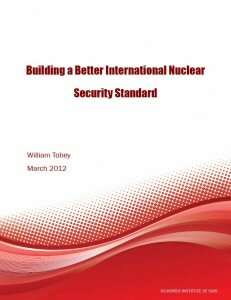 That al Qaeda or another group bent on inflicting the maximum possible carnage might attain a nuclear capability is the greatest threat to international security today. A 1986 National Intelligence Estimate concluded that a small number of groups may have been capable of high-level nuclear terrorism, if they had access to a weapon or sufficient fissile material, but were inhibited by the political consequences. Since then, the march of scientific and technological progress has pushed farther and farther past the frontier that was once marked by nuclear weapons. Once at the edge of scientific knowledge, nuclear weapons technology is now largely an engineering problem. There is more computing power in an iPhone than existed on the mesas of Los Alamos in 1945, and advances in computer aided design and manufacturing have spread high precision engineering around the world. In short, betting anything consequential on the notion that terrorists would be incapable of setting off a nuclear device, were they able to obtain fissile material, would be foolish.
That al Qaeda or another group bent on inflicting the maximum possible carnage might attain a nuclear capability is the greatest threat to international security today. A 1986 National Intelligence Estimate concluded that a small number of groups may have been capable of high-level nuclear terrorism, if they had access to a weapon or sufficient fissile material, but were inhibited by the political consequences. Since then, the march of scientific and technological progress has pushed farther and farther past the frontier that was once marked by nuclear weapons. Once at the edge of scientific knowledge, nuclear weapons technology is now largely an engineering problem. There is more computing power in an iPhone than existed on the mesas of Los Alamos in 1945, and advances in computer aided design and manufacturing have spread high precision engineering around the world. In short, betting anything consequential on the notion that terrorists would be incapable of setting off a nuclear device, were they able to obtain fissile material, would be foolish.
Access to fissile material is key—both for terrorists trying to attain a nuclear capability, and those racing to stop them. And global stocks of fissile material—highly enriched uranium and plutonium separated from spent fuel—are roughly 2,000 metric tons and growing. Moreover, this material is spread across dozens of sites, with hundreds of buildings, in 30 some countries, under varying security conditions. Consequently, the security of fissile material is not merely a theoretical concern. Over the past two decades the IAEA has recorded some 20 cases in which weapons-grade material has been seized outside of authorized control.
In this paper, William Tobey (Belfer Center, Harvard University) illustrates the very real threat of nuclear terrorism that looms today, which has been the impetus for the Nuclear Security Summit process, and suggests what measures the international community should be taking to ensure a higher standard of security for all nuclear material.
William Tobey is a senior fellow at the Harvard Kennedy School’s Belfer Center for Science and International Affairs. Prior to joining the Belfer Center, Mr. Tobey was most recently the Deputy Administrator for Defense Nuclear Nonproliferation at the National Nuclear Security Administration. There, he managed the US government’s largest program to prevent nuclear proliferation and terrorism by detecting, securing, and disposing of dangerous nuclear material. Mr. Tobey also served on the National Security Council Staff in three administrations, in defense policy, arms control, and counter-proliferation positions. He has participated in international negotiations ranging from the START talks with the Soviet Union, to the Six Party Talks with North Korea. He also has extensive experience in investment banking and venture capital.
For other papers in this series, visit our NSS Working Paper Series page.
For more resources on the Seoul Nuclear Security Summit and the NSS process, visit our NSS Program page.
DOWNLOADS
- William Tobey, “Building a Better International Nuclear Security Standard,” USKI Working Paper Series, US-Korea Institute at SAIS: Johns Hopkins University, March 2012.



